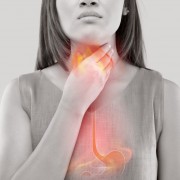What you need to know about heartburn
Professor Benjamin C.Y Wong answers some common questions on heartburn

Heartburn symptoms are often triggered after eating. Why does this happen and what foods might trigger such symptoms?
Heartburn symptoms are often triggered after eating because eating, especially a heavy meal, increases the chance of food regurgitation. Regurgitation is the spitting up of food from the oesophagus or stomach without nausea or forceful contractions of the abdominal muscles. Some of the food items known to induce heartburn symptoms include alcoholic beverages, coffee, fatty meals, fried food, citrus fruits like lemon, lemonade or even lemon tea. A fraction of patients are also intolerant to sweet foods or desserts, which can trigger heartburn.
If left untreated, can persistent heartburn lead to serious complications?
Yes, chronic heartburn or acid reflux may lead to serious complications, mainly injury to the oesophagus. Some of the conditions include inducing lesions or any inflammation or irritation of the oesophagus called oesophagitis, oesophageal ulcers as well as oesophageal stricture, which is a narrowing of the passageway from the throat to the stomach. Another serious condition is Barrett’s oesophagus, which occurs when cells in the lining of the oesophagus are damaged, a condition that can lead to oesophageal cancer.
Does heartburn increase the risks of throat cancer?
Although heartburn may lead to Barrett’s oesophagus, which is a condition that increases the risk of oesophageal cancer, there has been no definite association established yet between heartburn and throat cancer.
Can you recommend certain preventive methods to avoid heartburn?
To prevent or reduce the likelihood of acid reflux or heartburn, some of the following methods might work, although they may not be 100 percent effective. First, I recommend that people not consume any food three to four hours before bed. Next, do not eat too much at one go. Another important factor is to control or reduce one’s weight because obesity is a strong predictor of reflux, which is why my next recommendation is to regularly exercise. Finally, avoid consuming items like coffee, fatty food, citrus food, lemon tea and alcohol and stop smoking.
Professor Benjamin C.Y. Wong is honorary clinical professor at the Department of Medicine of the University of Hong Kong.
This story was originally published in the Global Health and Travel issue of January 2018.
Related Articles
Why do patients see a gastroenterologist?
Dr Tan Chi Chiu discusses the gastrointestinal symptoms patients usually present with
Read moreWhy do patients develop reflux?
Dr Tan Chi Chiu looks at the symptoms and causes of gastroesophageal reflux disease
Read moreWhat to do if you have blood in the stool
Dr Prabhjot Singh Sidhu suggest the best course of action for people who have blood in the stool
Read moreLatest Articles
Medical Care
Achieving Swift Recovery: Enhanced Recovery (ERAS) Direct Anterior Approach Total Hip Replacement
Consider total hip replacement with Alps Orthopaedic Centre's ERAS Direct Anterior Approach for faster recovery and reduced hospital stays. Learn about Dr. Jerry Chen's expertise in Singapore.
Read moreMedical Care
Enhanced Recovery (ERAS) Total Knee Replacement
Discover how Alps Orthopaedic Centre's Enhanced Recovery After Surgery (ERAS) approach transforms total knee replacement into a day surgery, offering faster recovery, less pain, and reduced hospital bills. Learn about Dr. Jerry Chen's expertise and schedule your appointment in Singapore.
Read moreMedical Care
Clinical Exercise Physiologist (CEP): The Emerging of Exercise is Medicine
How Exercising can be a Medicine
Read more